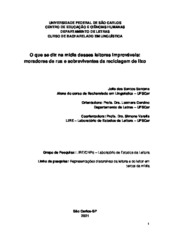| dc.contributor.author | Santana, Julia dos Santos | |
| dc.date.accessioned | 2021-10-18T10:57:59Z | |
| dc.date.available | 2021-10-18T10:57:59Z | |
| dc.date.issued | 2021-01-19 | |
| dc.identifier.citation | SANTANA, Julia dos Santos. O que se diz na mídia desses leitores improváveis: moradores de rua e sobreviventes da reciclagem de lixo. 2021. Trabalho de Conclusão de Curso (Graduação em Linguística) – Universidade Federal de São Carlos, São Carlos, 2021. Disponível em: https://repositorio.ufscar.br/handle/ufscar/15016. | * |
| dc.identifier.uri | https://repositorio.ufscar.br/handle/ufscar/15016 | |
| dc.description.abstract | In this work, we present the continuity of analysis and results obtained in our Scientific Initiation research entitled "Infamous Readers: Garbage collectors and homeless people and their representations in the media as a reading community", whose main objective is that of analyzing and demonstrating how certain discursive representations of reading practices attributed to unexpected readers are constructed in the media, to subjects who, living on the margins of society, are not considered as potential readers and who, once identified with books, become they make news, namely, people who make a living from collecting and recycling garbage and homeless people. The set of texts that make up our corpus of analysis is the result of a survey of texts via general internet search engines or from the media institutions themselves, from newspapers and magazines, but also from personal and/or institutional news blogs. We found that these representations of these readers are textualized in different discursive genres, such as news, reports, interviews. We observe the great regularity in the way these representations of reading and readers are presented in these texts. Reading is always presented in its saving, redemptive facet. Readers are presented as individuals who 'decide', who 'choose' to become readers, who read mainly printed books, particularly literature, do so for pleasure and for their education, and find in reading a way to change their lives. Our analyzes of this material are based on the principles of the French Discourse Analysis, the Cultural History of Reading and also on some postulates of the History of Emotions. | eng |
| dc.description.sponsorship | Não recebi financiamento | por |
| dc.language.iso | por | por |
| dc.publisher | Universidade Federal de São Carlos | por |
| dc.rights | Attribution-NonCommercial-NoDerivs 3.0 Brazil | * |
| dc.rights.uri | http://creativecommons.org/licenses/by-nc-nd/3.0/br/ | * |
| dc.subject | Discursos sobre a leitura | por |
| dc.subject | Leitores infames | por |
| dc.subject | Livro no lixo | por |
| dc.subject | Moradores de rua e Catadores de lixo | por |
| dc.title | O que se diz na mídia desses leitores improváveis: moradores de rua e sobreviventes da reciclagem de lixo | por |
| dc.title.alternative | What is said in the media of these unlikely readers: homeless people and survivors of garbage recycling | eng |
| dc.type | TCC | por |
| dc.contributor.advisor1 | Ferreira, Luzmara Curcino | |
| dc.contributor.advisor1Lattes | http://lattes.cnpq.br/4849994635754652 | por |
| dc.contributor.advisor-co1 | Varella, Simone Garavello | |
| dc.contributor.advisor-co1Lattes | http://lattes.cnpq.br/2960953221144305 | por |
| dc.description.resumo | Neste trabalho de conclusão de curso, apresentamos a continuidade de análises e de resultados obtidos na realização de nossa pesquisa de Iniciação Científica intitulada “Leitores infames: Catadores de lixo e moradores de rua e suas representações na mídia como comunidade leitora”, cujo objetivo principal é o de analisar e demonstrar como são construídas, na mídia, certas representações discursivas das práticas de leitura atribuídas a leitores inesperados, a sujeitos que, vivendo à margem da sociedade, não são considerados como potenciais leitores e que, uma vez identificados com livros, se tornam notícia, a saber, pessoas que vivem de catar e reciclar lixo e moradores em situação de rua. O conjunto de textos que compõe nosso corpus de análise é resultado de um levantamento de textos via buscadores da internet gerais ou das próprias instituições midiáticas, provenientes de jornais e revistas, mas também de blogs pessoais e/ou institucionais de notícias. Constatamos que essas representações desses leitores se encontram textualizadas em gêneros discursivos diversos, tais como notícias, reportagens, entrevistas. Observamos a grande regularidade na forma como essas representações da leitura e dos leitores se apresenta nesses textos. A leitura é sempre apresentada em sua faceta salvacionista, redentora. Os leitores são apresentados como indivíduos que ‘decidem’, que ‘escolhem’ se tornar leitores, que leem sobretudo livros impressos, em particular de literatura, o fazem por prazer e para sua formação, e encontram na leitura um meio para mudarem de vida. Nossas análises desse material se apoiam em princípios da Análise do Discurso de linha francesa, da História Cultural da Leitura e também em alguns postulados da História das Emoções. | por |
| dc.publisher.initials | UFSCar | por |
| dc.subject.cnpq | LINGUISTICA, LETRAS E ARTES::LINGUISTICA::TEORIA E ANALISE LINGUISTICA | por |
| dc.publisher.address | Câmpus São Carlos | por |
| dc.contributor.authorlattes | http://lattes.cnpq.br/0647076054873742 | por |
| dc.publisher.course | Linguística - Ling | por |

